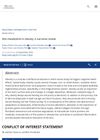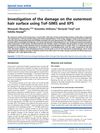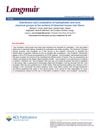 9 citations,
October 2008 in “Mutation research”
9 citations,
October 2008 in “Mutation research” N-acetyl-L-cysteine (NAC) can prevent DNA damage and protect cells from harm.
 October 2023 in “Toxicology and Applied Pharmacology”
October 2023 in “Toxicology and Applied Pharmacology” Finasteride is more harmful to male reproductive health than minoxidil.
March 2022 in “International Journal of Trichology” Smoking may worsen hair loss, but more research is needed.
 September 2024 in “Wound Repair and Regeneration”
September 2024 in “Wound Repair and Regeneration” Obesity harms skin health by causing inflammation and delayed wound healing.
Oxidized hair can naturally regain strength and stability over six months.
October 2021 in “Technology transfer: innovative solutions in medicine” The combined treatment improved scalp health in women with early-stage hair loss.
 25 citations,
December 2011 in “Surface and interface analysis”
25 citations,
December 2011 in “Surface and interface analysis” Bleaching hair causes significant damage by breaking down proteins and fatty acids.
 99 citations,
June 2005 in “Journal of Cosmetic Dermatology”
99 citations,
June 2005 in “Journal of Cosmetic Dermatology” Hair ages due to genetics and environmental factors, leading to graying and thinning, with treatments available for some conditions.
 36 citations,
October 2014 in “Langmuir”
36 citations,
October 2014 in “Langmuir” Bleaching hair removes its protective top layer and exposes more hydrophilic groups, changing its chemical surface and affecting how it interacts with products.
March 2023 in “Chinese Journal of Dermatology” Protecting hair and scalp from sunlight may help prevent hair loss.
30 citations,
September 2018 in “International Journal of Cosmetic Science” Bleaching hair causes severe structural and chemical damage, including protein loss and oxidation.
 3 citations,
January 2020 in “Plastic and Aesthetic Research”
3 citations,
January 2020 in “Plastic and Aesthetic Research” Non-surgical procedures can help reduce wrinkles and stimulate skin repair by understanding skin aging at the molecular level.
 November 2023 in “Frontiers in cell and developmental biology”
November 2023 in “Frontiers in cell and developmental biology” Hair aging is caused by stress, hormones, inflammation, and DNA damage affecting hair growth and color.
 March 2013 in “Molecular & Cellular Toxicology/Molecular & cellular toxicology”
March 2013 in “Molecular & Cellular Toxicology/Molecular & cellular toxicology” m-Aminophenol in hair dye can cause skin cell toxicity and stress responses.

Hair coloring and bleaching can permanently break down hair protein and temporarily change its properties.
55 citations,
March 2010 in “Aging” Circadian clock genes are important for hair growth and may affect aging-related hair loss and graying.
 34 citations,
March 2020 in “BMC plant biology”
34 citations,
March 2020 in “BMC plant biology” Graphene oxide and indole-3-acetic acid together inhibit root growth in Brassica napus L. by affecting multiple plant hormone pathways.
 24 citations,
May 2010 in “Hautarzt”
24 citations,
May 2010 in “Hautarzt” Different hormones affect hair growth and conditions, with some causing hair loss and others promoting it.
 22 citations,
August 2019 in “Environmental research”
22 citations,
August 2019 in “Environmental research” Pseudomonas sp. T5-6-I bacteria increase selenium uptake in Brassica oleracea plants by 130%.
 7 citations,
January 2022 in “Animal Reproduction”
7 citations,
January 2022 in “Animal Reproduction” Using rodents for research shows that health problems in the womb can cause diseases later in life.
 7 citations,
June 2021 in “Trends in Food Science and Technology”
7 citations,
June 2021 in “Trends in Food Science and Technology” Western diet may cause male pattern baldness; low glycemic diet with magnesium could help.

New treatments for vitiligo may focus on protecting melanocyte stem cells from stress and targeting specific pathways involved in the condition.
 November 2024 in “IP Indian Journal of Clinical and Experimental Dermatology”
November 2024 in “IP Indian Journal of Clinical and Experimental Dermatology” Certain skin conditions can indicate a higher risk of diabetes and heart problems.

Early detection and comprehensive treatment of PCOS are crucial due to its long-term health impacts and associated risks.
 April 2022 in “Journal of applied science and environmental management”
April 2022 in “Journal of applied science and environmental management” Alligator pepper seed extract improved wound healing in rats.
 October 2021 in “QJM: An International Journal of Medicine”
October 2021 in “QJM: An International Journal of Medicine” Vitiligo patients have higher hydrogen peroxide levels and lower E-cadherin, affecting skin cell adhesion and pigmentation.
March 2020 in “The Egyptian Journal of Histology” Topical olive oil protects mice skin from harmful electromagnetic radiation.
 August 2016 in “The journal of investigative dermatology/Journal of investigative dermatology”
August 2016 in “The journal of investigative dermatology/Journal of investigative dermatology” The hexosamine pathway helps protect skin cells from stress and may improve skin and hair health.
 December 2021 in “Indian Journal of Dermatology, Venereology and Leprology”
December 2021 in “Indian Journal of Dermatology, Venereology and Leprology” Men with androgenetic alopecia, or hair loss, often have abnormal blood flow in their small blood vessels, which might be linked to inflammation and stress.
 1 citations,
July 2022 in “Functional foods in health and disease/Journal of functional foods in health & disease”
1 citations,
July 2022 in “Functional foods in health and disease/Journal of functional foods in health & disease” Taking a probiotic supplement twice a day improved hair growth, skin hydration, and metabolic health in adults at risk of metabolic syndrome.























